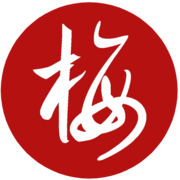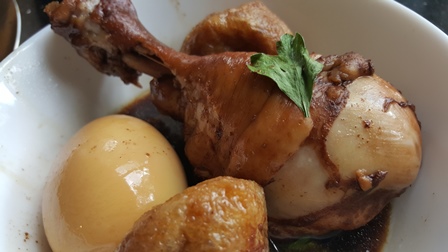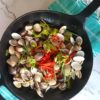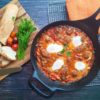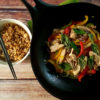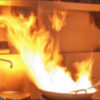Almost every Chinese dialect group has its own version of the braise, and every family will have a version passed down for generations, too.
According to my mother, my paternal grandmother probably has the best braise in her world. My granny came from Guilin (桂林) and spoke nothing but Guangxi (广西)。She spoke Cantonese sparingly but most of the time, she would complete her sentences in the dialect she grew up speaking.
I wish I have asked her for her braise duck recipe. When I was younger, I spent quite a bit of time in Malaysia where she and gramps had migrated to from Guilin, China when she was a young bride. My grandmother would stir over her pot of stew the whole day, adding herbs, spices and ingredients a little at a time until her duck is done. Always to perfection. Her special ingredient was a kind of fermented bean curd.
My paternal grandmother was very soft spoken and unassuming. My mother said she was the best mother-in-law in the world. She was always quiet and understanding. The only thing I remember her telling me in her broken Cantonese is about her trip to Malaysia on the boat. I hardly understood her. The first thing I remember she did with me was to purchase a pair of purple slippers with a yellow flower when I was four. That pair of slippers are still in the ancestral home today.
The only person who was fluent in the same dialect was my late father, her eldest son. But my father died at 58, and I picked up less than 20 words of 广西 dialect. I also did not learn my grandmother’s cooking from my dad who was a culinary genius.
It is stated in my birth certificate that my dialect group is Cantonese, but my sister’s says Guangxi. Presumably, the registrar who did my birth certificate was too presumptuous. While Guangxi is part of Canton, I wished they would be more specific. We are from a very special part of China.
That’s a long story to tell everyone that the braise in Guangxi is really good. The other place that has really famous braise is Teochew (潮州), which is also part of Canton. The version of braise I am documenting here is the Thai version, which is probably borrowed from the Teochews since most elderly Thai Chinese still speak Teochew these days.
I have tried the Taiwanese, HongKong, Thai versions. The HongKong version is great for chicken, the recipe is here. This Thai/Teochew version is good for duck, pork, chicken, egg and intestines. It is saltier and taste more traditional to me. While the former version relies on the rose wine, this version relies on the five-spice powder. The best five-spice blend for the braise I have found is that from Thailand, called Pae-lo and here’s how it looks like:
I have overcooked mine in this photo, and should have reduced the time to 12 minutes on the pressure cooker. The recipe is accurate, though. When I cook this again, which is probably a few months later, I will update with a better photo.
Chinese Braise for Meat and Eggs
Ingredients
- 1 Chicken or Duck or 5 Chicken drumsticks
- 1 Tbsp Five-Spice Powder
- 1 Tbsp Cooking Oil
- 5 hard boiled Eggs optional
Braising Sauce
- 2 Tbsp Dark Soya Sauce
- 1 Tbsp Soya Sauce
- 2 cloves Garlic minced
- 1 Onion
- 1 Tbsp Sesame Oil
- 1 Tbsp Brown Sugar
- 1/2 tsp Pepper
- 2 cups Water
- 1 tsp Five-spice powder
Instructions
- Season the meat with the 1 tablespoon of five-spice powder and set aside for not more than 2 hours.
- Heat up a wok or pressure cooker with cooking oil.
- On low heat, fry the garlic till very light brown.
- Add the meat and caramelize the meat lightly.
- Add all the ingredients of the braising liquid.
- Bring to a boil, add eggs and cover the wok or pot.
- Cook until meat is done. For the pressure cooker, it is 20 minutes for a whole bird and 12 minutes if using chicken, duck or pork parts.
